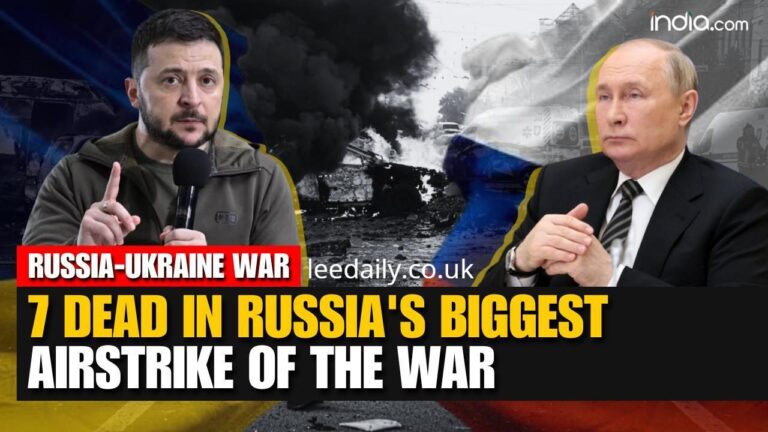Introduction: The ongoing conflict between Russia and Ukraine, which began in 2014 and escalated significantly in 2022, has captured global attention and raised critical questions about international relations, security, and human rights. Russia’s involvement in the war has been a focal point of global discourse, with far-reaching implications not only for the region but for the world at large. In this blog post, we’ll delve into the key aspects of Russia’s role in the conflict, exploring the origins, motivations, and current developments in the Russia-Ukraine war.
Background of the Conflict:
- The Annexation of Crimea (2014): The roots of the current conflict can be traced back to Russia’s annexation of Crimea in 2014. Following Ukraine’s Euromaidan protests and the subsequent removal of President Viktor Yanukovych, Russia moved to annex Crimea, citing the protection of Russian-speaking citizens as a justification. This act was widely condemned by the international community and led to the imposition of sanctions against Russia.
- The Donbas Conflict: Following the annexation of Crimea, pro-Russian separatists in the Donetsk and Luhansk regions of eastern Ukraine declared independence, leading to an armed conflict with Ukrainian forces. Russia has been accused of providing support to these separatists, including weapons, training, and direct military involvement, although Russia has consistently denied these allegations.
Russia’s Motivations:
- Geopolitical Interests:
- Regional Influence: Russia has long viewed Ukraine as part of its sphere of influence, and the idea of Ukraine moving closer to the West—particularly joining NATO—has been perceived as a direct threat to Russian security. By asserting its influence over Ukraine, Russia aims to prevent further Western encroachment in the region.
- Strategic Importance of Crimea: Crimea holds significant strategic importance due to its location on the Black Sea, which hosts Russia’s Black Sea Fleet. Controlling Crimea allows Russia to project power in the region and secure its maritime interests.
- Ethnic and Cultural Ties:
- Protection of Russian-Speaking Populations: Russia has framed its involvement in Ukraine as a mission to protect the rights of Russian-speaking populations in Crimea and eastern Ukraine. This narrative has been used to justify its actions both domestically and internationally.
- Domestic Politics:
- Nationalism and Popular Support: The conflict has been used by the Russian government to galvanize nationalist sentiment and rally domestic support. The portrayal of Russia as a protector of its ethnic kin and a defender against Western aggression has resonated with many Russians.
Current Developments:
- The 2022 Invasion:
- Full-Scale Invasion: In February 2022, Russia launched a full-scale invasion of Ukraine, marking a significant escalation in the conflict. The invasion was met with widespread condemnation, leading to a new wave of sanctions and unprecedented international response.
- Military Objectives: Russia’s stated objectives included the “demilitarization” and “denazification” of Ukraine, though these terms have been widely criticized as pretexts for aggression. The invasion led to intense fighting, with major cities like Kyiv, Kharkiv, and Mariupol becoming focal points of the conflict.
- International Response:
- Sanctions and Diplomatic Isolation: The invasion triggered severe economic sanctions against Russia, targeting key sectors such as finance, energy, and technology. Russia has also faced significant diplomatic isolation, with numerous countries condemning its actions and supporting Ukraine.
- Humanitarian Crisis: The war has resulted in a severe humanitarian crisis, with millions of Ukrainians displaced and widespread destruction of infrastructure. The international community has mobilized to provide aid to those affected, but the situation remains dire.
- Ongoing Conflict:
- Stalemate and Attrition: As of now, the conflict remains ongoing, with neither side achieving a decisive victory. The war has settled into a war of attrition, with significant casualties on both sides and no clear end in sight.
- Peace Talks and Negotiations: Various attempts at peace talks have been made, but a lasting resolution has yet to be reached. The prospects for peace remain uncertain, with both sides holding firm on their positions.
Impact on Russia and the World:
- Economic Consequences: The sanctions imposed on Russia have had significant economic repercussions, leading to inflation, a decline in the ruble’s value, and challenges in accessing international markets. However, Russia has also adapted by finding alternative trade partners and focusing on self-sufficiency.
- Global Security: The Russia-Ukraine war has raised concerns about global security, particularly in Europe. The conflict has led to a reassessment of NATO’s role and the defense strategies of European nations, with several countries increasing their defense budgets and reconsidering their military alliances.
- Energy and Food Security: The war has also impacted global energy markets, as Russia is a major supplier of oil and gas. Additionally, Ukraine’s role as a key exporter of grain has led to concerns about global food security, particularly in regions reliant on these exports.
Conclusion: The Russia-Ukraine war is one of the most significant geopolitical conflicts of the 21st century, with profound implications for Russia, Ukraine, and the international community. Russia’s involvement in the conflict, driven by a complex mix of geopolitical, cultural, and domestic factors, has reshaped global politics and security. As the war continues, the world watches closely, hoping for a peaceful resolution but preparing for the challenges that lie ahead.
Call to Action: Stay informed about the ongoing conflict by following reputable news sources and supporting humanitarian efforts in Ukraine. Understanding the complexities of this war is crucial for appreciating its global impact and advocating for peace.
